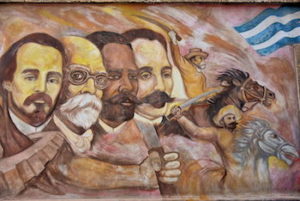
Havana Mural Late 19th-Century Heroes
*On this date in 1868, Cuba's Ten Years' War began. Also known as the Great War (Guerra Grande) and the War of '68, it was part of Cuba's fight for independence from Spain.
Cuban-born planters and other wealthy natives led the uprising. Sugar mill owner Carlos Manuel de Céspedes and his followers proclaimed independence and began the conflict. This was the first of three liberation wars that Cuba fought against Spain, the other two being the Little War (1879–1880) and the Cuban War of Independence (1895–1898).
Cuban business owners demanded fundamental social and economic reforms from Spain, which ruled the colony. Lax enforcement of the slave trade ban resulted in a dramatic increase in imports of Africans, estimated at 90,000 slaves from 1856 to 1860. Slavery occurred despite a strong abolitionist movement on the island and rising costs among the slave-holding planters in the east. New technologies and farming techniques made many enslaved people unnecessary and prohibitively expensive. In the economic crisis of 1857, many businesses failed, including many sugar plantations and sugar refineries. The abolitionists favored the gradual emancipation of slaves with financial compensation from Spain for slaveholders.
Additionally, some planters preferred hiring Chinese immigrants as indentured workers in anticipation of ending slavery. Before the 1870s, more than 125,000 were recruited to Cuba. In May 1865, Cuban Creole elites placed four demands upon the Spanish Parliament: tariff reform, Cuban representation in Parliament, judicial equality with Spaniards, and full enforcement of the slave trade ban. By early 1869, the Spanish colonial government had failed to reach an agreement with the insurrection forces; they opened a war of extermination.
The colonial government passed several laws: arrested leaders and collaborators of the insurgency to execute on the spot, ships carrying weapons were seized, and all persons on board were immediately executed. Males 15 and older caught outside of their plantations or places of residence were executed. All towns had to raise the white flag or be burnt. Any woman caught away from her farm or home would be taken to camps. Apart from its army, the government relied on the Voluntary Corps and a militia recruited a few years earlier. The corps executed eight students from the University of Havana on November 27, 1871. They seized the steamship Virginius in international waters on October 31, 1873.
Starting in November, its forces executed 53 persons, including the captain, most of the crew, and several Cuban insurgents on board. The serial executions were stopped only by the intervention of a British man-of-war under the command of Sir Lambton Lorraine. In the "Creciente de Valmaseda" incident, the corps captured farmers and the families of Mambises, killing them immediately or sending them to concentration camps on the island. Another Voluntary Corps was German, the so-called "Club des Alemanes." Presided by Fernando Heydrich, a committee of German merchants and landowners created a troop to defend their possessions in 1870.
A neutral force initially, as ordered by Otto von Bismarck in a telegram to Consul Luis Will, they were considered to favor the government. Pact of Zanjón Under the pact's terms, a constitution and a provisional government were set up, but the revolutionary élan was gone. The interim government convinced Maceo to give up, and with his surrender, the war ended on May 28, 1878. Many Ten Years' War graduates became central players in Cuba's War of Independence, which started in 1895. These include the Maceo brothers, Maximo Gómez, and Calixto Garcia. The final three months of the last conflict escalated with United States involvement, leading to the Spanish American War.